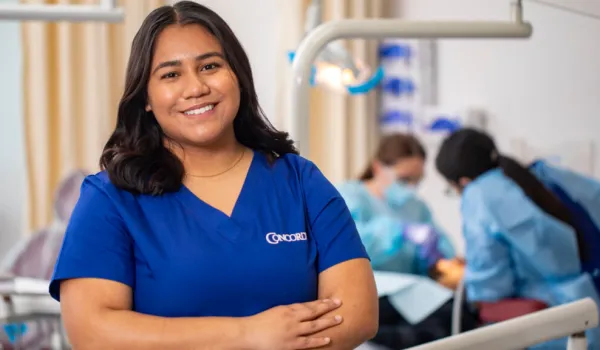
After your service in the military, you get to make exciting decisions about what you want to do and how you want to accomplish your goals. Going back to school to complete or advance your education is a great decision that will make you highly competitive in the job market. Whether you've never explored higher education, have already completed a few years of college or have earned a degree, transitioning from the military to a structured learning environment can sometimes be a difficult transition.
We've put together a list of tips on how to make the most of your pursuit of a degree or diploma after military service that will help you make all the necessary preparations you need for your newfound educational journey.
Be Financially Prepared
Tuition-wise, there are a large variety of benefits military veterans are eligible for, as well as special assistance programs through Concorde. However, it is important to be aware of your finances and carefully plan your expectation of cost. For example, housing is often an expense people forget to factor into their overall cost.
However, it is important to consider that you will also now need to factor in expenses you did not have during your service. You'll need to budget for your weekly groceries, utilities, phone bill, insurance, gas for your car or a public transportation pass, clothes, and hobbies. The best option here is to find a cost-effective, conveniently located program. Concorde offers programs that can be completed in as little as eight months, so you won't be trying to finance four years of school in order to get your degree.
Be sure to also apply for Federal Student Aid by the deadline for the best opportunity for grants and loans. By working out a solid plan and opting for such a financially smart schooling program, you won't have to worry about racking up a huge debt.
Time Management Is Your Friend
During your time in the service, you definitely got a feel for working long hours with little recreational time. However, even though you are used to being "busy," college is often a completely new kind of busy!
While you may be confident in your ability to manage your time and take a full semester of credit hours, you don't want to end up stretching yourself too thin and not doing well in your classes. In addition, if your GPA drops, you may no longer qualify for certain scholarships or other financial aid.
As opposed to a job in which you have a supervisor or trainer to help guide you through the process of acclimating into something new, college is a bit different. You will have mentors available to you but on a professional level. You will need to be able to learn to effectively manage your time and goals on your own.
You may be able to quickly adjust to this new and demanding schedule, however. You just need to be mentally prepared. Even if you have dabbled in college courses or went to school prior to your service and know what to expect from a higher education setting, remember that a full-time course load will be more challenging. Don't be afraid to study up on your foundational knowledge on your own before jumping into a higher learning situation or a highly advanced area of study.
We recommend looking into options for organization and time management, such as a calendar app or a physical planner. You may not have had to remember a vast number of deadlines or timelines for projects on your own before, and taking the time to find the right tools to help you get into an organizational mindset could be a game-changer in your ability to stay on top of projects, papers, and exams. When organizing your week, be sure you schedule in time for studying as well as long-term assignments or papers, and factor in doing assigned readings or research for your classes.
Be Prepared to Rebuild Your Social Life
It's not uncommon for veterans to go through a period of social mourning after they leave the service. After being used to the social camaraderie and family culture of the military, when that lifestyle abruptly ends, it can be a bit of a social shock. For some, this may feel like an immediate loss, and for others, it may be a slow realization that relationships are different now.
This is why making new friends and discovering a new way of approaching social relationships is so important. Be sure to take advantage of the organizations and clubs available to you to help you forge new friendships. Chances are, there's a veteran-lead event organization available to help you meet like-minded peers from a similar background as you.
It is also important to acknowledge that while being a veteran has its own unique pressures and mental health difficulties, over a fourth of all college students deal with mental health issues (2).
The bottom line here is that you should prepare yourself to reach out and make new friends, and make sure you keep your mental health in check. If you are struggling, consider talking to a therapist about how to best approach forging new social relationships and ensure you are getting help with any other underlying mental health issues.
Keep It Professional
It's important to remember that now that you are pursuing an education and a new career, you should be actively working on building the image of yourself you want to show to the world, and more importantly, to job recruiters - both in-person and online. In other words, it may not immediately occur to you as you are developing your social media presence, but you should be especially careful regarding what you are posting online. Be aware of the image you are creating to represent yourself to the world and future employers.
It's important to remember that even if it feels like just a personal account to show your personality, that everything you put online is public. It is not uncommon for recruiters to look on potential candidates' social media profiles to get a clearer picture of their character. Make sure you keep your public comments on the internet appropriate.
Think of it as building your brand. You want to sell yourself as a responsible, accomplished adult of good character with what you post online. Be thorough and intentional about what you post, and make it clear what you stand for.
Network, Network, Network
You want to build relationships with people who can endorse you and refer you to new opportunities. Everyone who has a big network of trusted contacts started out just like you - no contacts at all, working to meet the right people. If you make an effort to network and get to know others in your field, you never know just how much it could pay off in the future.
One way you can develop career contacts is through internship programs or community service opportunities that are tailored to your career interests. For example, if you are hoping to work in the health care field, you may consider volunteering at a hospital or working as a desk intern at a clinic. While navigating these experiences, keep in mind that you are interacting with people who can teach you about your industry's standards in regards to professionalism, vocational skills, and work ethic. Take the opportunity to watch and learn from them, and forge a personal connection with those individuals you admire within your chosen field.
From here, you get to then become a person who is looked up to and admired in your field. By curating professional relationships, you will have the contacts to help guide you through professional opportunities and help you get a competitive edge on the job market.
Develop Your Ideal Career Path
College is about learning who you are and what you want to be. Stay curious and you will be able to identify which classes most spark your interest and excitement. Say you know you want to do something in the medical field, but you aren't exactly sure what yet. If you'd like to work with patients, consider shadowing different vocations, such as massage therapy, occupational therapy, or radiology. From exploring the areas of the field that spark your interest, you will be able to choose the right focus for your career goals.
Know When to Ask for Help
After years of serving in the military, it may be difficult for you to know when to ask for help. As a professional in your industry, people are relying on you to be resourceful, accurate, and confident. However, you won't always feel like that's possible. Managing a full-time course workload, internship opportunities, and hands-on training can be overwhelming. However, you don't have to do it alone.
One of the most important things to keep in mind when you are in college is that your instructors are there to help you. If you don't understand something, take advantage of their office hours. If you are worried about missing a class, ask the professor for the slides in advance or ask a classmate to share their notes. It can be challenging to reach out and admit you need help, but you're in a school to close the gap of what you do and don't know, and you have a lot of resources at your disposal to help you get there if you are willing to ask.
Explore Educational Benefit Options
Because we know how challenging this transition is not only for you but for your family, Concorde works closely with veterans and their families to make their transition back to school as pain-free as possible. Military Central is our avenue of programming dedicated solely to military veterans and their families. Concorde also offers options for assisting you with paying for tuition.
Military Central
No matter how much you researched, prepared, and committed to furthering your higher education, going back to school can still feel like you made a huge leap of faith - especially after years of serving in the military. This is why we are so dedicated to providing veterans a solid foundation and head start in your educational future as you plan the next step. Military Central connects veterans to instructors with ample industry experience. Veterans will also be able to connect with educators in the field who have a military background.
Financing Opportunities
Being a veteran opens up a lot of opportunities for financial aid when it comes to returning to school. Concorde offers financial assistance guidance to help you understand all of your options for financing and ease your transition. We will walk you through the application process and aide in determining the best options for every individual financial situation. Veterans have access to Federal Tuition Assistance, the Top-Up Program (3), and specific financial resources and opportunities that are specific to the major military branches and National Guard and Reserves.
Tuition Assistance Program
In addition to educational benefits offered to qualifying veterans, Concorde also offers a Military Tuition Assistance Program, benefiting military spouses and dependents. This essentially provides $1,000 towards tuition for the spouses and children under age 24 of active duty, active guard, reserves, and veterans. In addition, these individuals will have their registration fees waived.
Take the First Step
Now that you've gotten a feel of what you should expect when making the decision to go back to school after being in the military, it is time to find a program that is right for you. If you're already registered, we commend you for taking the first step to envision a bright future for you and your family.
Footnotes:
1. "Going Back to School After Transitioning," Military.com, https://www.military.com/veteran-jobs/career-advice/military-transition/going-back-to-school-after-transitioning.html
2. "GI Bill Top-Up," va.org, https://va.org/gi-bill-top-up/
Take The Next Step Towards a Brighter Future
We have a Concorde representative ready to talk about what matters most to you. Get answers about start dates, curriculum, financial aid, scholarships and more!




